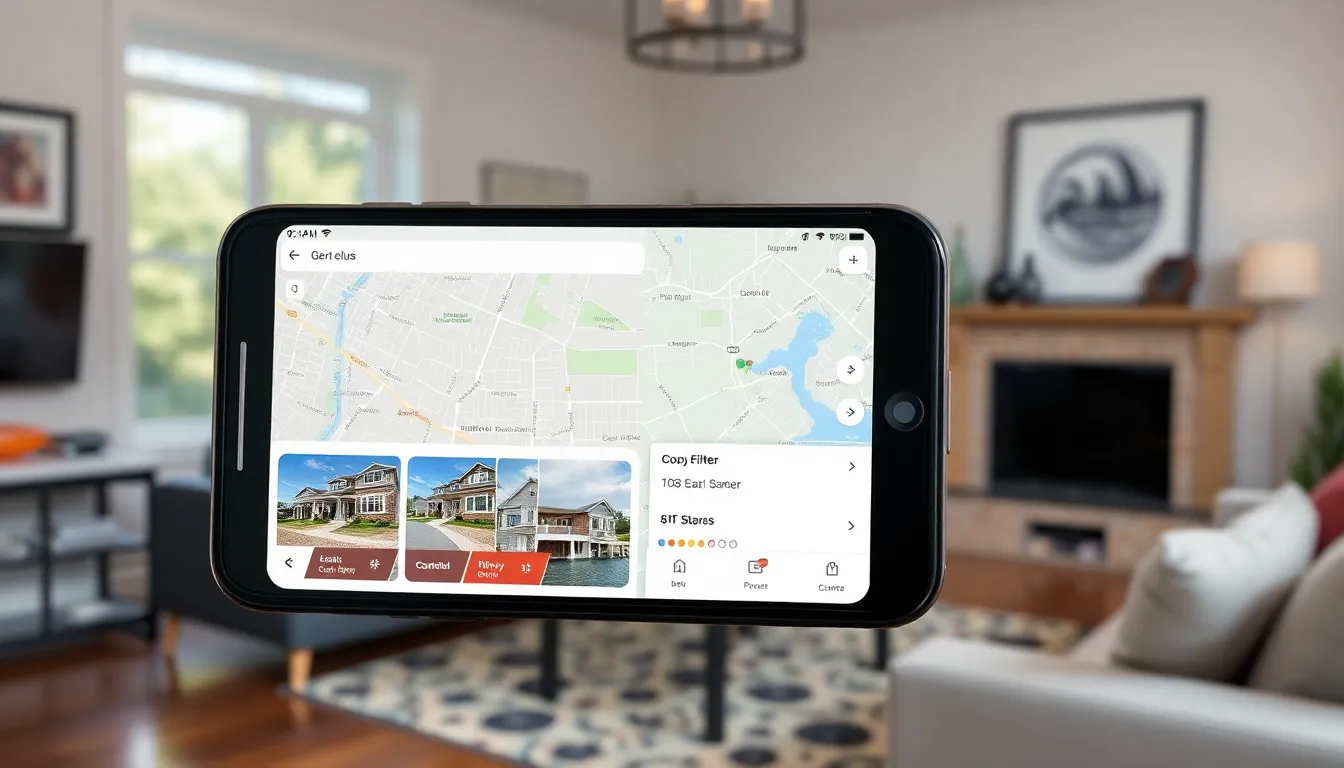Table of Contents
ToggleIn today’s fast-paced world, real estate apps have transformed how people buy, sell, and rent properties. With just a few taps on a smartphone, users can access a wealth of listings, market trends, and neighborhood insights, making the process more efficient and user-friendly. These apps cater to everyone from first-time homebuyers to seasoned investors, providing tools that simplify decision-making.
As technology continues to evolve, so do the features of these applications. Virtual tours, augmented reality, and advanced filtering options allow users to explore properties like never before. With the right real estate app, navigating the complex housing market becomes not only manageable but also enjoyable. Discover how these digital platforms are reshaping the real estate landscape and what to look for in the best options available.
Overview of Real Estate Apps
Real estate apps streamline property transactions for buyers, sellers, and renters. These applications provide comprehensive listings that include crucial details such as price, square footage, and amenities. Users can filter search results based on various criteria, including location, budget, and property type, increasing their chances of finding suitable options.
Real estate apps utilize advanced features to enhance user experience. Users benefit from virtual tours that allow them to explore properties remotely. Augmented reality features let users visualize properties in real-world settings. These technologies make property exploration more interactive and informative.
Market analysis tools within real estate apps offer insights into current market trends. Users access data on neighborhood statistics, including average home prices and historical sales data. This information helps users make informed purchasing, selling, or renting decisions.
Collaboration tools also play a key role. Real estate professionals can communicate with clients directly through these apps. This feature increases the efficiency of property transactions, allowing for timely updates and feedback.
Security measures maintain user data privacy. Most real estate apps implement encryption and secure login processes to protect sensitive information. Users can browse and transact with confidence, knowing their data remains protected.
Key Features of Real Estate Apps

Real estate apps incorporate several key features that enhance the user experience and streamline transactions. These features include intuitive user interfaces, robust search functionalities, and comprehensive property listings.
User Interface and Experience
User interfaces focus on simplicity and accessibility. They ensure that potential buyers can navigate easily without confusion. Effective apps often utilize clean layouts with clear menus, allowing users to find desired features quickly. Responsive designs adapt to various devices, enhancing usability on smartphones and tablets. User engagement increases with visual elements, such as high-quality images and interactive maps.
Search and Filter Options
Search and filter options provide users with tailored experiences. Users can search properties based on location, price range, square footage, and number of bedrooms or bathrooms. Advanced filters may include features like swimming pools, garages, or energy-efficient appliances, meeting specific preferences. Sorting capabilities allow users to prioritize results by price, newest listings, or property types. Real-time updates ensure users access the latest listings, keeping them informed on market opportunities.
Property Listings and Details
Property listings showcase essential information about available properties. Each listing typically includes high-resolution photos, detailed descriptions, and vital statistics like square footage and lot size. Users can easily access information about nearby schools, parks, and public transportation options, enriching their understanding of the property’s location. Virtual tours enable users to explore properties remotely, facilitating better decision-making without requiring physical visits. Comprehensive listings empower users to compare multiple properties effectively, enhancing the overall purchasing or renting experience.
Popular Real Estate Apps
Numerous real estate apps enhance property transactions by providing vital information and user-friendly features. Here are some of the most popular real estate apps available today.
Zillow
Zillow stands out as a leading real estate app, offering an extensive database of property listings across the United States. Users can access detailed property information, including price, square footage, and neighborhood data. Zillow provides advanced filter options, allowing users to narrow searches according to specific needs. The app features Zestimate, an estimated market value tool for homes, which aids buyers and sellers. Users also benefit from interactive maps and the ability to connect with local agents, enhancing the overall buying experience.
Realtor.com
Realtor.com delivers accurate and up-to-date listings directly from MLS databases, making it a reliable source for property seekers. Users can view comprehensive property insights, including amenities and neighborhood statistics. Realtor.com incorporates innovative search filters to streamline the property search process, ensuring users find suitable options quickly. Moreover, the app features a robust user interface, prioritizing accessibility for both novice and experienced buyers. Notifications of new listings and price changes help users stay informed in a competitive market.
Redfin
Redfin offers an innovative approach to real estate, combining detailed listings with a user-centric experience. Users benefit from real-time data directly from local agents, ensuring accuracy and timeliness. The app’s map-based search feature simplifies property exploration, allowing users to view homes based on location easily. Additionally, Redfin provides tools for price history and market trends, empowering users to make informed decisions. The built-in scheduling functionality makes arranging property visits straightforward, enhancing the overall efficiency of the buying or selling process.
Benefits of Using Real Estate Apps
Real estate apps offer various advantages that enhance the property buying, selling, and renting experience. These benefits include convenience, accessibility, and time-saving capabilities.
Convenience and Accessibility
Convenience features make real estate apps indispensable. Users can search for properties anytime and anywhere using smartphones or tablets. Accessibility improves further with user-friendly interfaces, allowing quick navigation through listings and essential property details. Notifications and alerts ensure users stay updated on new listings or price changes, helping them act promptly in competitive markets.
Time-Saving Capabilities
Time-saving capabilities optimize the real estate process. Users can filter property searches based on specific criteria, such as price, location, and amenities, narrowing down options efficiently. Virtual tours save time by allowing users to explore properties remotely, eliminating the need for unnecessary in-person visits. Additionally, direct messaging features facilitate communication between buyers and agents, expediting decision-making and reducing delays in transactions.
Challenges and Limitations
Real estate apps face several challenges and limitations that can impact user experience and decision-making. Understanding these pitfalls helps users navigate the digital landscape more effectively.
Data Accuracy
Data accuracy poses a significant challenge for real estate apps. Listings may contain outdated information, leading to confusion for users. Properties can be marked as available when they are sold or withdrawn, which misleads potential buyers. Users rely on accurate data for informed decision-making, making it crucial for apps to regularly update their databases. Additionally, discrepancies in property descriptions and pricing can exacerbate trust issues, hindering the user experience. Accurate and reliable data is essential for users to base their decisions on current market conditions.
Market Competition
Market competition among real estate apps presents another limitation. Numerous applications vie for user attention, leading to inconsistencies in features and service offerings. While some apps innovate rapidly, others lag behind, creating an uneven user experience. This competition can also drive down the quality of information provided, as apps may prioritize speed over accuracy. Users may struggle to determine which app best meets their needs amidst an overcrowded marketplace. Real estate professionals must stay aware of this competitive landscape to effectively choose platforms that provide the best value and services.
Real estate apps have fundamentally changed how individuals engage with the property market. Their ability to provide instant access to listings and vital market data empowers users to make informed choices. With features like virtual tours and advanced search filters, these applications cater to diverse needs and preferences.
As technology continues to evolve, real estate apps will likely enhance their offerings even further. Users can expect improved accuracy in listings and innovative tools that streamline transactions. Embracing these digital platforms can lead to a more efficient and enjoyable real estate experience, whether buying, selling, or renting. The future of property transactions is undoubtedly digital, and staying informed about the best apps available is essential for anyone navigating the market.




